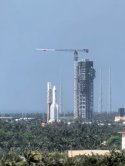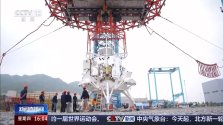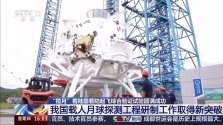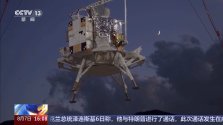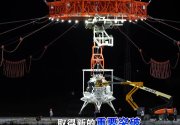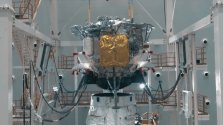You are using an out of date browser. It may not display this or other websites correctly.
You should upgrade or use an alternative browser.
You should upgrade or use an alternative browser.
China's Space Program Thread II
- Thread starter Blitzo
- Start date
by78
General
Tianbing/Space Pioneer will begin development of a new variant of Tianlong-2 rocket in preparation for sending cargo to the Chinese space station.

The new variant of Tianlong-2 will be put into serial production in March of 2026 and then make its first flight in August.

According to this latest CCTV interview (which was recorded for 2024 Zhuhai Airshow), CZ-10 series' maiden flight will be its variant w/o boosters, i.e. CZ-10A. There're at least two CZ-10A launches planned in 2026, one is its maiden flight, another one is its first recovery.
So we may see CZ-10A ready to launch & recovery for LEO satellite missions (similar to SpaceX F9 for starlink), before its brother CZ-10 ready for lunar missions?
View attachment 157635
View attachment 157637
That isn't a surprise; the single core version of the rocket is naturally less ambitious than the triple core lunar variant.
Whether they successfully recover it before the triple core lunar variant has its first test flight, is another matter.
Technically the 1st flight of CZ-10 series will be the Low Altitude (suborbital) flight, which is likely to happen this autumn.According to this latest CCTV interview (which was recorded for 2024 Zhuhai Airshow), CZ-10 series' maiden flight will be its variant w/o boosters, i.e. CZ-10A. There're at least two CZ-10A launches planned in 2026, one is its maiden flight, another one is its first recovery.
So we may see CZ-10A ready to launch & recovery for LEO satellite missions (similar to SpaceX F9 for starlink), before its brother CZ-10 ready for lunar missions?
View attachment 157635
View attachment 157637
CZ-10A will likely be initially entirely dedicated to the CMSA for now, Chinarocket has been mentionning possibilities of a commercial CZ-10A, but the earliest date is late 2027, not before.
Video of one of the descent test without music:In a milestone development, China has successfully conducted landing and takeoff verification tests of the Lanyue manned lunar lander.



I do wonder if they'll test the Lunar module and/or propulsion module in Low Earth orbit (launched by CZ-5 or CZ-10A), this could enable tests of Lanyue before the CZ-10, after all both Apollo and the L3 program had LEO lander tests. It may also be worth remembering that the Propulsion module uses the entirely new YF-58 Staged combustion hypergolic engine, I'd be surprised if it is first flown in the uncrewed lunar landing test.
I tried to estimate the scale of Lanyue.
According to Systems Engineering Technology for Overall Performance Improvement of Manned Lunar Exploration (ZHANG Hailian, 2023) & Optimal Design of Manned Lunar Descent Trajectory in Mid-Course separation mode (Hou Zhendong et al, 2023) the Delta V requirement of the Lunar Module of Lanyue is around 2100-2350m/s, while the Propulsion module is around 3000 m/s
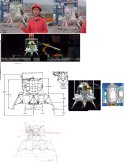
Geely preparing for its own Satellite constellation..
Smart Dragon-3 rocket's carrying 11 more satellites for the LEO satellite constellation invested by Chinese major car manufacturer Geely, who's planning to use it for their auto vehicle navigation & communication services.
Smart Dragon-3 rocket's carrying 11 more satellites for the LEO satellite constellation invested by Chinese major car manufacturer Geely, who's planning to use it for their auto vehicle navigation & communication services.
Last edited:
CZ-10A and CZ-10 are not in the relationship of one depending on the other, but two variants based on common technology. So better to see their time line independently like two different rockets, similar to CZ-7 vs. CZ-8.According to this latest CCTV interview (which was recorded for 2024 Zhuhai Airshow), CZ-10 series' maiden flight will be its variant w/o boosters, i.e. CZ-10A. There're at least two CZ-10A launches planned in 2026, one is its maiden flight, another one is its first recovery.
So we may see CZ-10A ready to launch & recovery for LEO satellite missions (similar to SpaceX F9 for starlink), before its brother CZ-10 ready for lunar missions?
View attachment 157635
View attachment 157637
If we look back at Chang'e program, the 7500N landing engine was used on the first landing without LEO test, only static test. It has never made any problems. LEO test may speed up things a little bit, but from China's track record, existing ground testing regime is probably adquate.I do wonder if they'll test the Lunar module and/or propulsion module in Low Earth orbit (launched by CZ-5 or CZ-10A), this could enable tests of Lanyue before the CZ-10,
If you are talking about Apollo-9, that was a crewed test with Saturn V (corresponding to CZ-10). That mission included many things, not only the propulsion of LM, but docking which is a great challenge at the time. They did it in LEO most likely because of the concern of crew safety, it was easier to return to the ground because the CM is nearby. They had to do it with crew because of lack of automation. If they had the computer power of today they may do it in LLO to speed up things, remember Apollo-10 did just that (LM deceleration from LLO without landing).after all both Apollo and the L3 program had LEO lander tests. It may also be worth remembering that the Propulsion module uses the entirely new YF-58 Staged combustion hypergolic engine, I'd be surprised if it is first flown in the uncrewed lunar landing test.
Today China has done many times of automated LLO docking, descent, ascent and return in Chang'e program. For China doing a LLO test of lander propulsion module/YF-58 test is not much different from LEO due to automation. LLO test will be more accurate to reality because of the right gravity and no-air. The failure of LLO test will still give more knowledge than a failed LEO test.
In short USA and USSR did those tests because there were no capable automation back then, not really a necessity today.
Last edited:








